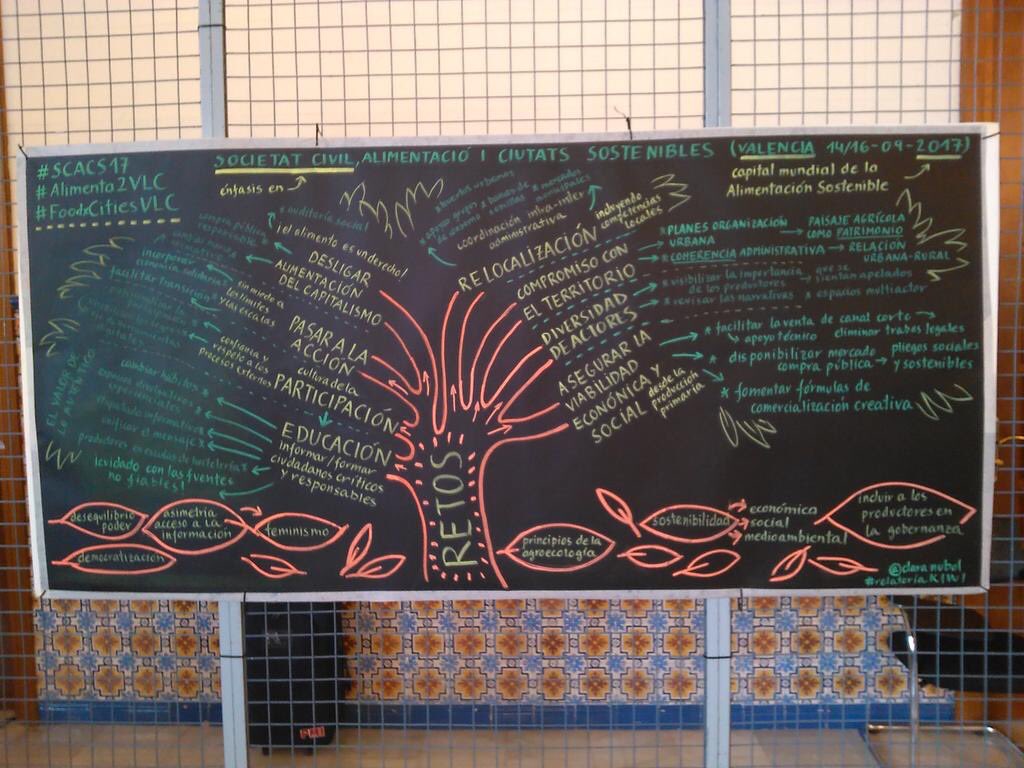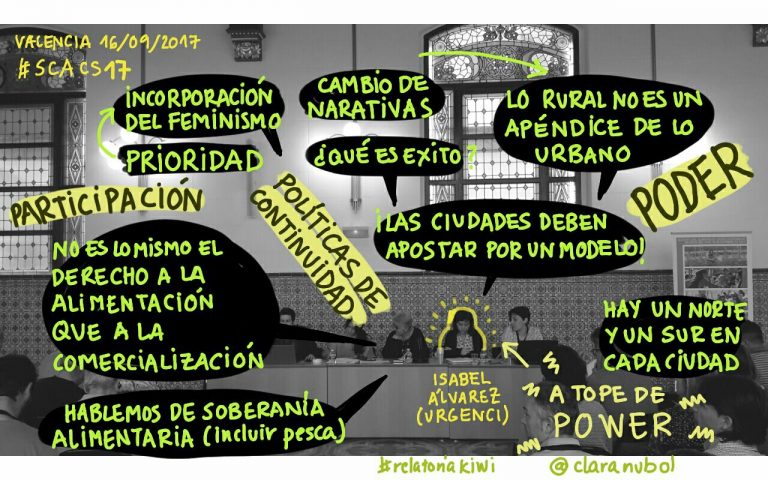On September 15 and 16, a meeting on “Civil Society, Food and Sustainable Cities” was held in Valencia. Its purpose was to bring together a significant number of actors of the urban agrifood system, focusing on the civil society organizations. In that context, URGENCI was invited to participate in a roundtable with other international networks, in which la Via Campesina, FIAN International and Access to land also participated.
Each participant was asked to answer three questions:
- What are the challenges of the urban agenda?
- What are the most successful initiatives?
- How can we achieve a common agenda between civil society and institutions?
All the speakers answered from their organization experience and their political vision on these topics. Isa Álvarez, representing URGENCI, underlined a number of issues that emerged from the different achievements carried out by URGENCI in different arenas: at global level, when participating in the Committee on World Food Security and Nutrition and obviously at local level, with the many CSA groups and their grassroots activities, among which their efforts to craft local policies.
Here are the challenges she highlighted:
The first major challenge would be for public authorities to take a clear position on the kind of production and consumption model they want to favour and to implement strong policy to implement it. The agro-industrial model is only survives by by destroying other alternatives. This therefore makes coexistence is impossible and municipalities should clearly choose their positions.
Another important challenge is to run contrary to the prevailing narrative that emphasizes the centrality of cities and the urban environment. The rural environment is not a mere appendage of the city, quite the contrary. Although most of the population now lives in cities, most municipalities are not urban. This narrative, as well as the one about smart cities and climate smart agriculture, has gradually dispossessed citizens of their decision-making abilities and their capacity to act. It must be denounced. We contstantly need to make food sovereignty visible and raise our voices on this subject. That is our goal.
The second challenge is how to to incorporate the feminist perspective into the arenas where policies are discussed and adopted. When talking about food and changing attitudes today, we do so in spaces where the distribution between women and men of tasks is still unequal. As long as roles are not equally distributed, many women continue bear the burden of the changes that are necessary to the food system.
A challenge we also should highlight is the difference between the rights’ holders and the so-called “interested parties”. Rights holders are individual human beings, not companies and we shall not allow anyone to forget the essential difference. The human right to food and nutrition must be the framework of our work, which means that our main focus must be human needs, not business interests.
The role of fishing is another key challenge. When we talk about food and even about food sovereignty we must take into account the land but should never overlook the role that fishing plays in a sustainable and nutritious diet.
Finally, the historical pattern of North and South has been broken by rapid urban development. Although some countries are wealthier than others, displacement and migration have generated “North and South patches” within a same country. This is no coincidence, and is part of the systemic DNA; inequalities get bigger as cities grow. It is important to take this issue into account when looking at the kind of city we want to build together.
Regarding the other questions, the answers were shorter:
– What are the successful projects? We could list many successful and vibrant CSA initiatives, but truly: what do we consider a successful project? More importantly: what is change? All our initiatives should be questioned from this perspective: What kind of change do we want?
– The answer to the question of building a common agenda is clear. We must build spaces to meet and discuss but not a common agenda. The rhythms of public authorities and of social movements are very different, as are their roles. If they were to merge, something would definitely go wrong!
Our objective must be to work together, but from our own perspectives. Social movements are here to expose, propose and build alternatives. The role of public authorities is still to be defined in this new political time that claims to be transformative.
Isa Álvarez, Urgenci’s advocacy officer.


